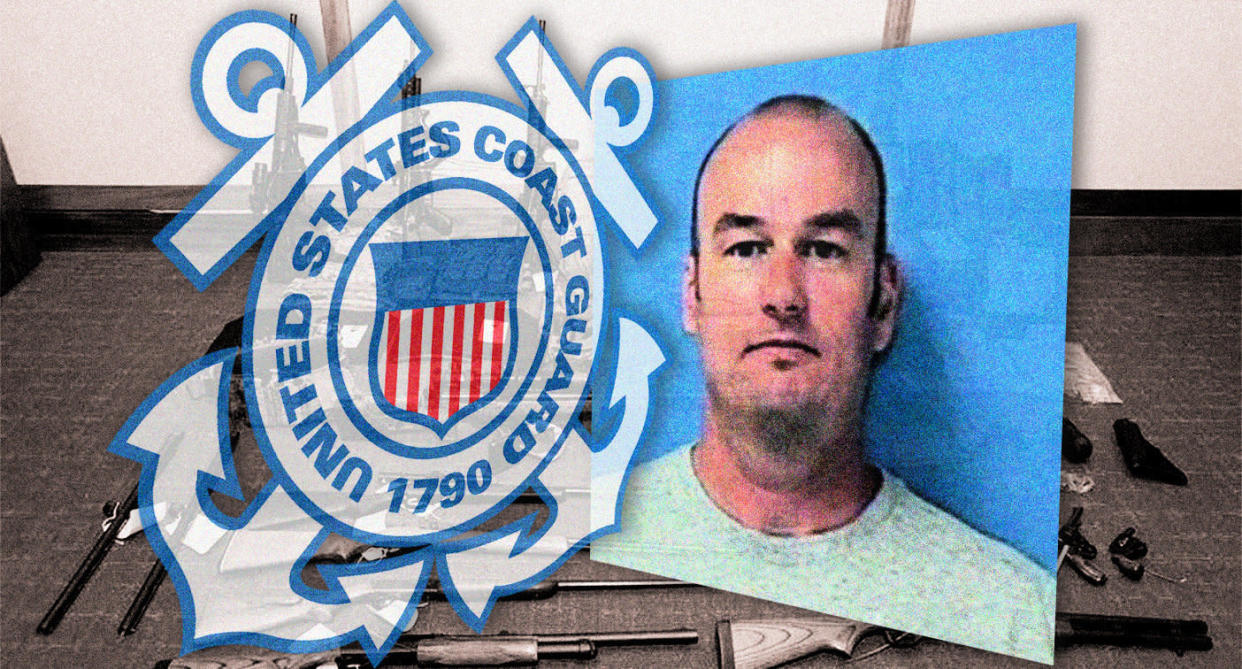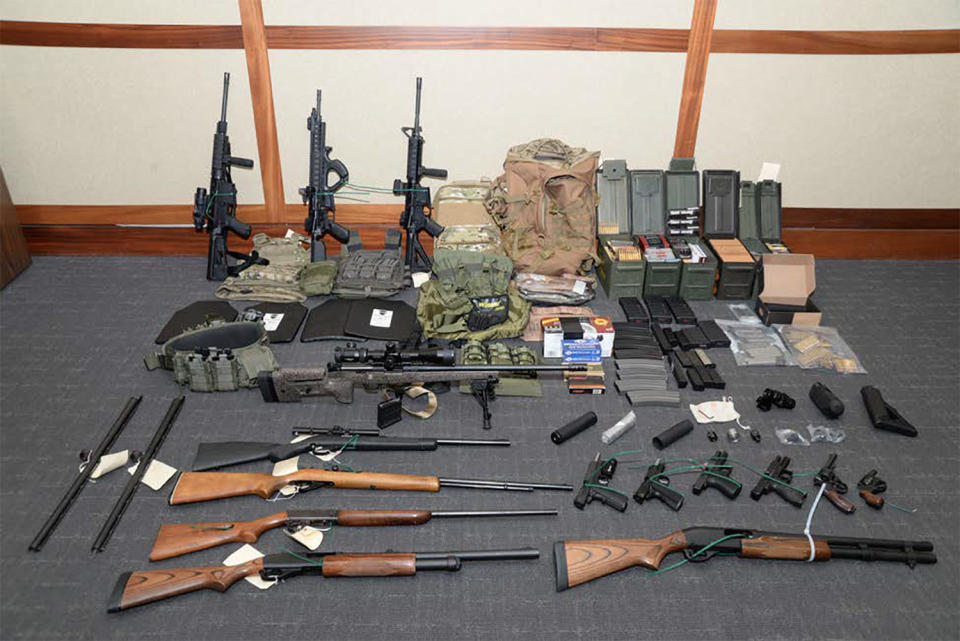Democratic lawmakers demand answers from Trump administration on extremists serving in U.S. military

House Democrats are calling upon the Departments of Defense and Homeland Security to address renewed concern over the incidence of white supremacy and other extremist affiliations among members of the military, following the recent arrest of a Coast Guard lieutenant who, according to federal prosecutors, was actively plotting deadly acts of domestic terrorism.
In a letter sent to Acting Defense Secretary Patrick Shanahan and DHS Secretary Kirstjen Nielsen on Monday, Maryland Reps. Elijah Cummings, Anthony Brown and Jamie Raskin, as well as California Rep. Jackie Speier, praised the “swift action taken by federal agencies” to arrest Christopher Hasson before he could carry out his alleged plans, but expressed concern “that an individual that espouses these views could repeatedly serve in the military across multiple services.”
According to court records, Hasson’s military career began in the Marine Corps, where he served from 1998 to approximately 1993, followed by two years of active duty with the Army National Guard. Since 2016, the 49-year-old lieutenant had been working as an acquisitions officer at the Coast Guard’s headquarters in Washington, D.C. It was from his work computer that federal prosecutors say Hasson, a self-described white nationalist who was arrested earlier this month on weapons and drug charges, studied the manifesto of the far-right Norwegian terrorist Anders Breivik and other extremist killers, and wrote of his desire to “kill almost every last person on the earth.”
“This latest incident is another in a series that tarnishes the proud legacy of the United States Armed Forces,” the Democratic lawmakers wrote in their letter, asking Nielsen and Shanahan to provide more information on the kinds of policies and procedures that their respective departments have in place to screen recruits for supremacist or extremist ties, and how Hasson and other military service members with ties to extremist movements were able to circumvent such checks.
In a phone interview with Yahoo News Monday, Maryland Rep. Jamie Raskin, one of the signatories of the letter, compared the “very disturbing pattern that has begun to emerge of racist and white supremacist activity taking place in the armed forces,” to the issue of “sexual assault and sexual harassment within the military: It just doesn't have any place there.”
Raskin said that he “definitely took note of what happened in Charlottesville,” referring to the 2017 white nationalist rally in Virginia where, as he and his colleagues noted in their letter Monday, at least a handful of attendees have since been identified as active duty service members or veterans with ties to extremist groups. However, Raskin said, “the Hasson event was a huge wake-up call, given that he lived in my district, about 10 minutes from my house, and he was on the hunt for liberal democratic Jewish politicians, which definitely caught my attention.”
Hasson, who reportedly lives with his wife in Silver Spring, Md., had allegedly listed “Sen blumen jew” (presumably a derogatory reference to Sen. Richard Blumenthal, D-Conn.) on a high-profile hit list that prosecutors say he had compiled of Democratic politicians and cable news commentators.

Concerns over right-wing extremists in the military goes back decades. Timothy McVeigh, who killed 168 people in the 1995 bombing of the Oklahoma City federal building, was a veteran of the Gulf War. Wade Michael Page, who murdered six people at a Sikh temple in Wisconsin in 2012, served in the Army. Frazier Glenn Miller, a Vietnam veteran, killed three people while targeting a Jewish center in Kansas in 2014. And James Alex Fields, who murdered Heather Heyer at the 2017 Charlottesville rally, served briefly in the Army in 2015 but was released after failing to meet training standards.
A 2017 poll of service members from the Military Times found a quarter of respondents said they had seen white nationalism in the ranks. The number was even higher among nonwhite troops, with 42 percent of minorities reporting that they had seen evidence of white nationalism.
According to Elizabeth Yates and Patrick James, researchers at the University of Maryland’s Study of Terrorism and Responses to Terrorism program, Hasson’s profile is not unusual for a far-right extremist. Their data suggests that far-right extremists are, on average, older (38 years) than far-left (30) or Islamist (29) extremists at the time that they are exposed, typically through arrest. Right-wing extremists are also more likely to have served, with 23 percent having military experience as against 10 percent of left-wing extremists and nine percent of Islamists in their database.
James told Yahoo News that it is not just active duty members and veterans who are being radicalized but that white supremacists are joining the military in order to receive combat training. A Washington Post report last week found that immigrants face more scrutiny than white supremacists when enlisting.
“Extremist organizations actively seek out active and veteran members of the military,” said James. “A lot of these groups really value the types of experience, tactical training, leadership ability that you get in the military so often, now, these groups are actively encouraging people to go and join the military to get that experience and then bring those skills back to their extremist groups. That’s another thing we need to look out for in terms of these groups actively seeking those types of experience.”
In 1996, after the Oklahoma City bombing (which was partially inspired by the far-right group National Alliance) and the racially motivated murder of a black couple by Army paratroopers, the Pentagon launched an investigation into extremists in the armed services. A 2009 study from the Department of Homeland Security stated that extremist groups would be likely to target disgruntled veterans returning from deployment. “The willingness of a small percentage of military personnel to join extremist groups during the 1990s because they were disgruntled, disillusioned, or suffering from the psychological effects of war is being replicated today,” the report said.

Last year, a report by ProPublica and Frontline PBS found that the hate group Atomwaffen Division, which has been connected to at least five murders, had ties to active-duty service members and veterans. They flagged one Marine, Vasillios Pistolis, as a participant in the violence at the deadly Charlottesville rally. The investigation found that Pistolis, who left Atomwaffen for another neo-Nazi group over a dispute in late 2017, espoused white nationalist beliefs before joining the military. Following the report, Pistolis was found guilty at a summary court-martial and subsequently expelled from the Marines last year.
The report also found that Army veteran Joshua Beckett had trained the Atomwaffen’s members in firearms and hand-to-hand combat. In the group’s chats, Beckett wrote that he suffered from post-traumatic stress disorder and explained how his time in the service had influenced his views.
“The army itself woke me up to race and the war woke me up to the Jews,” wrote Beckett.
The Trump administration has been criticized for not acting to counter the rise of far-right extremism. Last November, former Homeland Security staffers stated that the White House was not doing enough to combat white supremacists at home, and that the administration has failed to renew millions in funding for anti-extremism groups, despite raising the overall Homeland Security budget.
Complicating matters is that some of the groups are starting to train their members on how to avoid looking like a white supremacist.
“We have also seen from reporting and scholarship outside our database that in this recruiting, they’re also encouraging members if they do join to avoid signals that might tell a recruiter that they’re extremist,” said Yates, of the University of Maryland, “saying, ‘Don’t get tattoos, grow your hair long.’ And we just don’t know to what extent that’s being implemented.”
The origins of Hasson’s alleged white nationalist and extremist beliefs are still unknown. At a hearing last week, prosecutors indicated that they were likely to file terrorism-related charges against Hasson within the next 14 days.
“The Secretary has always denounced violent extremism in all of its forms and is committed to preventing individuals who espouse such views from joining the DHS workforce,” the DHS press secretary, Tyler Q. Houlton, said in a statement to Yahoo News Monday evening. “We are thankful our Coast Guard Investigative Service, along with our partners at the FBI, [we] were able to root out this threat. Hate and bigotry have no place at DHS or in our country.”
A statement provided on background from the U.S. Coast Guard echoed similar sentiments, noting that “the Coast Guard's insider threat program works closely with the Coast Guard Investigative Service to identify and respond to suspicious activity, as occurred in this case.”
“CGIS began investigating Lieutenant Hasson in the fall of 2018 after the Coast Guard Insider Threat Program first identified concerns about him,” read the Coast Guard’s statement to Yahoo News. “The FBI and CGIS arrested him once they were confident in the strength of the evidence supporting the criminal complaint and warrant.”
The Defense Department did not immediately respond to a request for comment.
Raskin told Yahoo News that the group of members of Congress who signed the letter would probably give both department heads a week or so to respond to their request, but that they were open to exploring other avenues for addressing the issue, such as potential hearings or meetings with military leadership.
“It’s something that we want to pursue very aggressively,” said Raskin. “We can't sweep this problem under the rug. We have to get on top of it now.”



